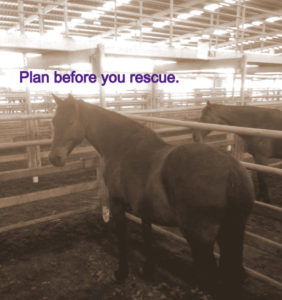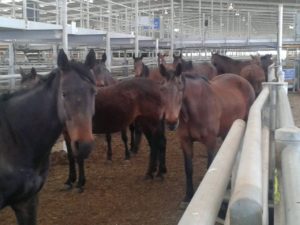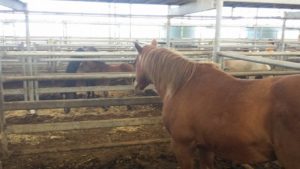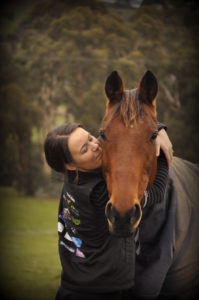I would like to address the topic of the rescue of horses who find themselves at various markets/saleyards.
As many of your would be aware, there are now several Facebook groups and pages facilitating the purchase of horses sitting in pens at markets, via credit card. This enables people to select and purchase a horse from the comfort of their homes, thus allowing more lives to be saved. In theory, this is a wonderful advancement and example of social media being used for good.
Whilst it is very noble to take in a horse from the markets or knackery yards, I implore those interested in doing so to consider the mammoth commitment you are making.
Horses from markets come from unknown backgrounds and so require specialized care. They will undoubtedly require a range of health care treatments within the first week or two of ownership (such as a dental and hoof review, worming, vaccinations, medicated washes for lice/fungal infections and possibly even veterinary checks of obvious or internal injuries). Some horses from markets may have behavioral vices, being mistrust of humans/nervousness, or strong defensive mechanisms that will need to be carefully managed by experienced and capable horsepeople (and professional training may be required to manage extreme cases). All horses require a suitable paddock, ready for the horse to move into from the moment they walk off the float. Horses have ongoing dietary needs and require other care provisions that cost money and take time to administer. And yes, horses sometimes injure themselves and require hundreds, or even thousands, of dollars worth of treatment.
Horse ownership is a huge commitment and something that should be carefully considered. If you are going to take in a new horse, please prepare yourself adequately for what is ahead and plan your purchase in advance. After all, a horse being left in limbo is just as tragic as one standing in the pens.
If you don’t own land, arrange agistment and speak to the property manager about your plans to bring home a horse from the sales. Book your farrier, dentist and other equine health professionals early, as many have busy schedules and require advanced appointments. Buy your wormers, vaccinations and horse feed prior to purchase, set up a support network of people who you can turn to for advice and have your transport prearranged.
Most importantly, please don’t rescue a horse and then seek to dump it on an equine welfare organization. Most programs have strict guidelines, to ensure that that there are enough hands on deck, paddock spaces and resources to provide adequate care for every animal that is accepted. It stresses the people involved in such organisations to have to decline horses a place in their herd.
Becoming a volunteer with an animal welfare group can make just as much of a difference as taking in a horse of your own and is a great alternative for those not in a position to rescue. Through involvement with registered organisations, you can gain a fantastic preview into what rescuing an animal entails and meet passionate and knowledgeable experts. If you’re looking to make a difference, jump on Google, find a local animal advocacy group and join a team.
If you’re going to take in a horse of your own, please plan before you rescue.
Reproduced from a Raising the Standards Facebook page post created in December 2013

Written by Raising the Standards Founder/Manager Nicole Tassone.







